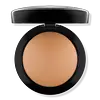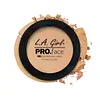Mac Cosmetics Mineralize Skinfinish Natural Face Powder Versus L.A. Girl Pro.Face Matte Pressed Powder
What's inside
What's inside
 Key Ingredients
Key Ingredients

 Benefits
Benefits

No benefits
 Concerns
Concerns

 Ingredients Side-by-side
Ingredients Side-by-side

Talc
AbrasiveMica
Cosmetic ColorantDimethicone
EmollientIsopropyl Palmitate
EmollientPolysorbate 20
EmulsifyingSimmondsia Chinensis Seed Oil
EmollientYeast Extract
Skin ConditioningTocopheryl Acetate
AntioxidantLauroyl Lysine
Skin ConditioningEthylhexyl Methoxycinnamate
UV AbsorberMagnesium Aluminum Silicate
AbsorbentSodium Dehydroacetate
PreservativePhenoxyethanol
PreservativeCI 77891
Cosmetic ColorantIron Oxides
CI 77163
Cosmetic ColorantCI 75470
Cosmetic ColorantCI 77288
Cosmetic ColorantCI 77289
Cosmetic ColorantCI 77510
Cosmetic ColorantCI 77742
Cosmetic ColorantCI 77007
Cosmetic ColorantCI 42090
Cosmetic ColorantCI 15850
Cosmetic ColorantCI 19140
Cosmetic ColorantCI 15985
Cosmetic ColorantTalc, Mica, Dimethicone, Isopropyl Palmitate, Polysorbate 20, Simmondsia Chinensis Seed Oil, Yeast Extract, Tocopheryl Acetate, Lauroyl Lysine, Ethylhexyl Methoxycinnamate, Magnesium Aluminum Silicate, Sodium Dehydroacetate, Phenoxyethanol, CI 77891, Iron Oxides, CI 77163, CI 75470, CI 77288, CI 77289, CI 77510, CI 77742, CI 77007, CI 42090, CI 15850, CI 19140, CI 15985
Talc
AbrasiveMica
Cosmetic ColorantSilica
AbrasiveMagnesium Stearate
Cosmetic ColorantSynthetic Wax
AbrasiveDimethicone
EmollientIsopropyl Isostearate
EmollientPentaerythrityl Tetraisostearate
EmollientHydrogenated Polyisobutene
EmollientPetrolatum
EmollientCetearyl Ethylhexanoate
EmollientEthylhexyl Methoxycinnamate
UV AbsorberPhenoxyethanol
PreservativeEthylhexylglycerin
Skin ConditioningTocopheryl Acetate
AntioxidantIron Oxides
CI 77491
Cosmetic ColorantCI 77492
Cosmetic ColorantCI 77499
Cosmetic ColorantCI 77891
Cosmetic ColorantTalc, Mica, Silica, Magnesium Stearate, Synthetic Wax, Dimethicone, Isopropyl Isostearate, Pentaerythrityl Tetraisostearate, Hydrogenated Polyisobutene, Petrolatum, Cetearyl Ethylhexanoate, Ethylhexyl Methoxycinnamate, Phenoxyethanol, Ethylhexylglycerin, Tocopheryl Acetate, Iron Oxides, CI 77491, CI 77492, CI 77499, CI 77891
Ingredients Explained
These ingredients are found in both products.
Ingredients higher up in an ingredient list are typically present in a larger amount.
Ci 77891 is a white pigment from Titanium dioxide. It is naturally found in minerals such as rutile and ilmenite.
It's main function is to add a white color to cosmetics. It can also be mixed with other colors to create different shades.
Ci 77891 is commonly found in sunscreens due to its ability to block UV rays.
Learn more about CI 77891Dimethicone is a type of synthetic silicone created from natural materials such as quartz.
What it does:
Dimethicone comes in different viscosities:
Depending on the viscosity, dimethicone has different properties.
Ingredients lists don't always show which type is used, so we recommend reaching out to the brand if you have questions about the viscosity.
This ingredient is unlikely to cause irritation because it does not get absorbed into skin. However, people with silicone allergies should be careful about using this ingredient.
Note: Dimethicone may contribute to pilling. This is because it is not oil or water soluble, so pilling may occur when layered with products. When mixed with heavy oils in a formula, the outcome is also quite greasy.
Learn more about DimethiconeEthylhexyl Methoxycinnamate is an organic compound that provides UVB protection. It often goes by the more common name of octinoxate. It is created from methoxycinnamic acid and 2-ethylhexanol.
Ethylhexyl Methoxycinnamate absorbs UVB rays with wavelengths between 280-320 nm. UV absorbers protect your skin by using chemical reactions to convert UV rays into heat and energy.
UVB (290-320 nm) rays emit more energy than UVA rays. They are capable of damaging DNA, causing sunburns and are thought to be linked to skin cancer.
The state of Hawaii has banned sunscreens containing octinoxate due to its potential impact on coral reefs. More research is needed to bridge gaps in this research. The European Union allows higher levels of octinoxate in sunscreens than the US and Australia.
Ethylhexyl Methoxycinnamate is oil soluble. It is not stable and may lose efficacy when exposed to sunlight.
Learn more about Ethylhexyl MethoxycinnamateMica is a naturally occurring mineral used to add shimmer and color in cosmetics. It can also help improve the texture of a product or give it an opaque, white/silver color.
Serecite is the name for very fine but ragged grains of mica.
This ingredient is often coated with metal oxides like titanium dioxide. Trace amounts of heavy metals may be found in mica, but these metals are not harmful in our personal products.
Mica has been used since prehistoric times throughout the world. Ancient Egyptian, Indian, Greek, Roman, Aztec, and Chinese civilizations have used mica.
Learn more about MicaPhenoxyethanol is a preservative that has germicide, antimicrobial, and aromatic properties. Studies show that phenoxyethanol can prevent microbial growth. By itself, it has a scent that is similar to that of a rose.
It's often used in formulations along with Caprylyl Glycol to preserve the shelf life of products.
Talc is a clay mineral. It helps absorb moisture and improve the texture of products. Like other types of clay, Talc can have a slight exfoliating effect on skin. Talc can be added to increase the volume of products.
Some Baby powders are made by combining talc with corn starch. The word "talc" comes from Latin and originates from Arabic. Talc is a mineral commonly found throughout the world.
If you have any concerns about using talc, we recommend checking out the FDA's official page.
Learn more about TalcTocopheryl Acetate is AKA Vitamin E. It is an antioxidant and protects your skin from free radicals. Free radicals damage the skin by breaking down collagen.
One study found using Tocopheryl Acetate with Vitamin C decreased the number of sunburned cells.
Tocopheryl Acetate is commonly found in both skincare and dietary supplements.
Learn more about Tocopheryl AcetateThis ingredient is a combination of red, black, and yellow iron oxide pigments. This combination of colors is usually found in foundation, because it results in a "skin" color.